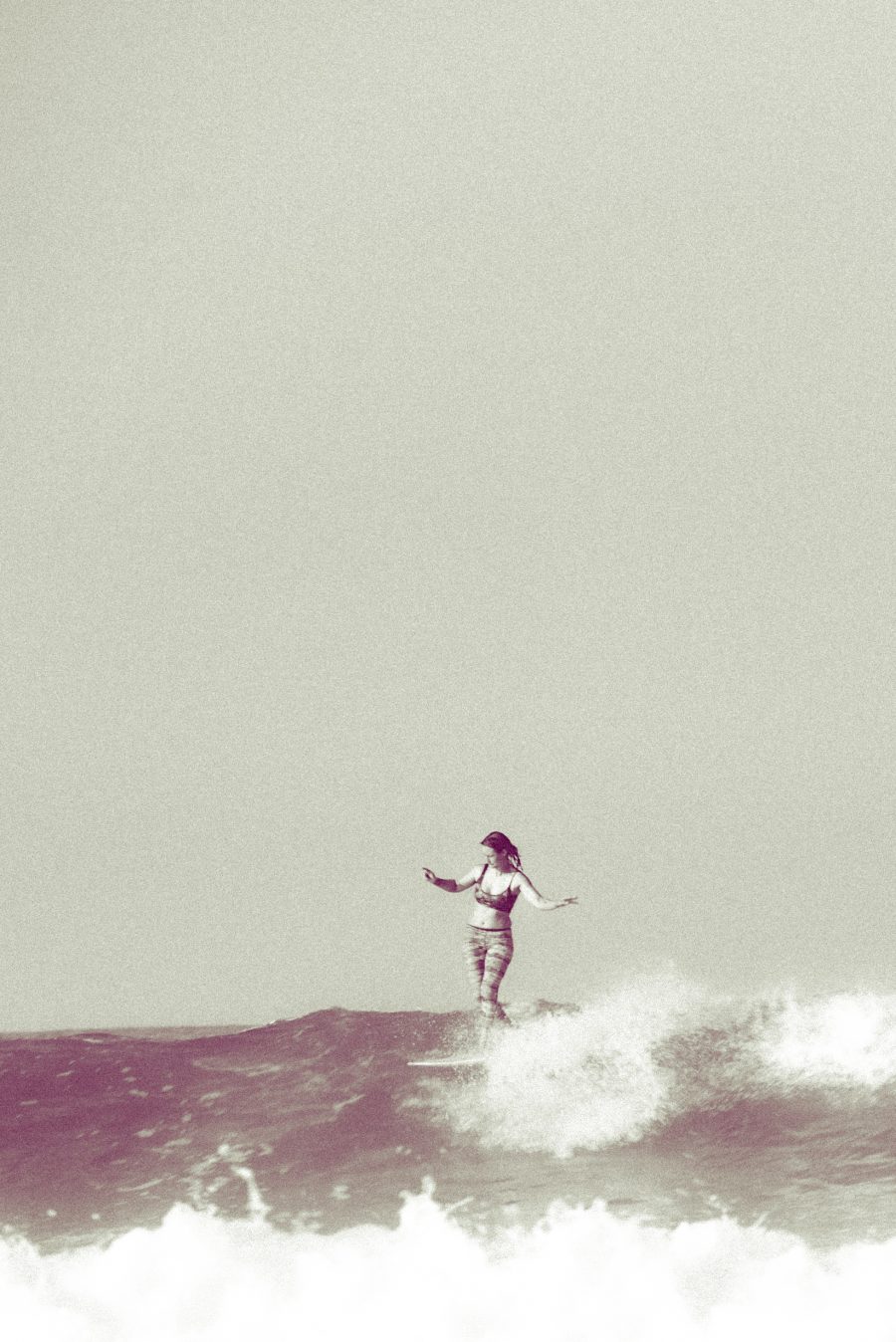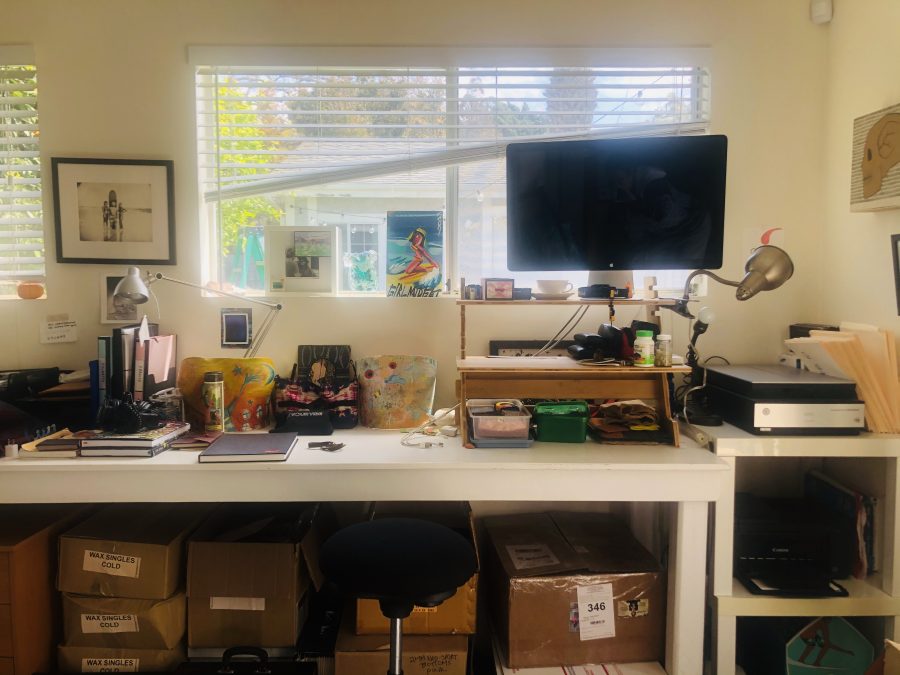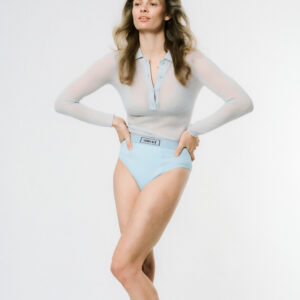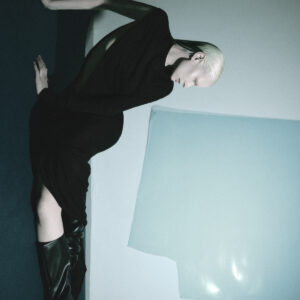Creatives in Confinement: Kassia Meador
Interview 23.04.20
Words Britta Burger Photography Lau Caustro + Kassia Meador
In this new series, ALSO talks to creative women around the world during the current COVID-19 global pandemic on how their output has changed, coping strategies for isolation and their hopes for the future.
Longboarder Kassia Meador, known for her graceful flow and crowned the “queen of noseriding” by the New York Times, has her own high vibe low-impact wetsuit brand Kassia + Surf and, as a holographic sound practitioner, combines sound healing and surfing. She’s currently in lockdown in her native California with her housemate.

“Right now the ocean is healing, it has a break from everybody.”
Where are you right now?
I’m back in California, which I have mixed feelings about, part of me wishes I’d stayed in Nicaragua, where I was doing a surf retreat. The retreat started just as we were going into the school lockdown, I was already over there, nobody knew it was going to get as wild as it did, so eleven women still came. The world changed in the week we were there together. So much that I didn’t even know if I should go back or stay at the end of it. But within three days they’d closed the borders to Costa Rica, then they closed the borders to El Salvador, it was, hey, get home while you can. I made sure everybody else left a day or two before me in case anybody got stuck.
What’s going on in California? I’m assuming the beaches are closed.
They’ve closed all the beaches, pretty much everybody is on pretty wild lockdown, LA county specifically with its dense population. For the most part we don’t use that much public transport, that has helped us a little bit.
How are you coping with the lockdown?
I’m just living simply, meditating a lot, stretching in the yard, bracing myself. Our government has been really horrible at making steps towards helping people who are out of work, I obviously don’t want anybody suffering, losing their jobs, losing their homes – but if I look at the positives it’s an opportunity for people to stop and to go deep within and see things in their lives that have become habits, that aren’t healthy or good for the planet, or a job they were so unhappy in. I’m visualising a world where we can all live in harmony with all life.
What are you personal steps towards this vision, will you do things differently after the lockdown?
It’s about choosing to slow down, not going into overdrive, resilience and patience within myself and others. Right now I don’t have a car, so I’ve been riding my bicycle everywhere, I’m more mindful of everything I consume, I’m realising how quickly I can get wrapped up in things…
“It’s about choosing to slow down, not going into overdrive, resilience and patience within myself and others.”
Does this slowing down also affect your creative output?
I already decided last year that I wasn’t going to produce anything on my own anymore. If I was going to make things they would be in collaboration with other brands, only utilising deadstock fabric. I am working on a wetsuit collaboration where we spent the last year sourcing all these deadstock fabrics. Even though we’d previously been making stuff with more eco minded fabrics, we were still making something and I really didn’t want to produce anything new anymore.

Kasia’s self-described “laundry room office… more of a standing desk shipping station”
How does the collaboration process work?
They have a wetsuit brand, I have a wetsuit brand, they’ve been wanting to do something with me and I like them, they are very small and local, just down the road. Most people would be in competition, but my whole thing is about collaboration.
I actually think it’s amazing that the Olympics is going to be postponed because of the virus, I think it’s an antiquated system. Celebrating competition is what got us in this place in the first place. If we use the money and the global unity factor of something like the Olympics and brought the world together to collaborate, imagine that! I’d had this deadstock idea for quite some time for example, but I’m only one person so I can only do so much, by collaborating all of a sudden there are three or four people working together so everyone can focus on what they’re best at, and you work more quickly and in a more cost effective way, with less resource acquisition.
How do you feel about surfing competitions in this light?
I hate competitions, I’ve always hated them, but they bring people together. Competing allowed me to get all over the world and to meet people all over the world. And that also supported me in having such a global perspective since I was young, kids in Germany are like kids in California, they want to have fun with their friends and be creative, we’re all people.
I agree that the best way to understand another culture is to go there, but there is also the environmental impact of flying, is this a dilemma for you?
It’s a blessing to go to lots of different places and I’m grateful to have gone, it teaches you so many lessons. We actually have so much technology that we should focus on more sustainable ways of travel. No one has been focussing on that, because that’s not where the money is. Brilliant minds are focussed on greed.
What do you miss most in this lockdown?
I do really want to go into the ocean. And at the same time I’ve also been really excited about the idea of sacrifice, which doesn’t mean to be without something, it means to make something sacred, and we’re sacrificing our time in the ocean. Right now the ocean is healing, it has a break from everybody.


